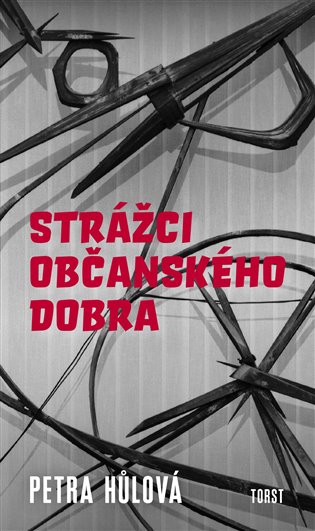
Guardians of the Public Good
April 2010, 212 pages
Available material: English sample, German sample
Foreign editions: Serbia (Plato), Egypt (Al-Arabi Publishing), Sweden (Ramus), Macedonia (Antolog)
Today‘s Czech reality through “the eyes of the defeated”
A young girl finds herself at odds with the rest of Czech society after the collapse of the Eastern Bloc in 1989. She had wholeheartedly believed in communism, and feels its values have been betrayed. In her opinion, the pre ’89 world was imperfect, but it was still the best possible organization of world. She sees so many blunders in the subsequent societal transformations that she has an urge to act – perhaps even violently – for the sake of „public good“.
A darkly grotesque story, which demonstrates the prescient possibility of totally different perspectives – what for one person might mean freedom yields anguish and desolation for others. Petra Hulová’s novels have never revelled in too much glee, but this work is even more unsettling than her previous ones. It paints a convincing picture of absolute confusion of languages inside one city.
“A successful attempt to reflect with depth and objectivity on the current atmosphere in society.”
— Literární noviny
“Guardians of the Public Good deal with the idea of what post-communism means in the heads of us all.”
– Salón Práva
From the sample translation
Not everybody’s wild about Krakow, my sister and I realized that a long time ago.
Sometimes, when I was little, it even seemed weird to me. It was supposed to be this amazing place. But all that was left of those plans were some jokes people told, plus names like Swimming Street, which was supposed to have a big pool with a wading pool and a slide, and Leisure Park, where they were supposed to plant trees with benches for recreation, but all it was was some shrubs in concrete holes and the senior citizens were scared to set foot in there after dark.
The playground never got finished either, and the tiles were all torn up in the fountains between the apartment blocks. They never sprayed once in my life. Instead of playing on the playground they never built, we played on the broken curbs and chunks of concrete out behind the buildings where there was supposed to be a woodland park but it looked more like some ancient Indian land in the Sahara, a bunch of wavy sand with a tuft of grass or two. Like in that movie Treasure of Silver Lake, except the dunes were just an embankment overgrown with dirty plants. At least you could use it for sledding. The treasure was pretty iffy too. Pierre Brice was no Indian and they shot it on location in Yugoslavia—we were raised on half-truths.